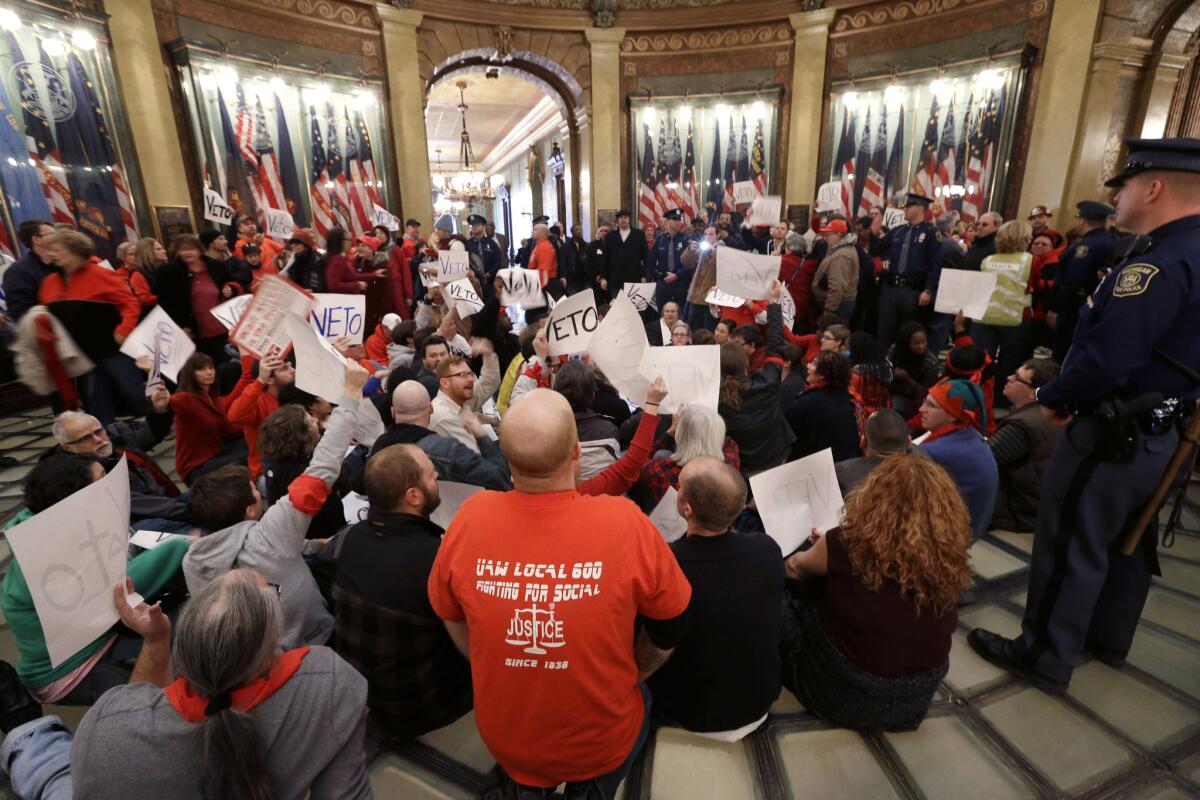Opinion: Why Americans support both unions and right-to-work laws

A new Gallup poll has some interesting data for pro-union folks to contemplate over this three-day weekend celebrating those of us who labor.
------------
FOR THE RECORD
An earlier version of this post mischaracterized when and how workers can be compelled to pay union dues.
------------
While a slight majority of Americans – 53% – say they support unions, a full 71% say they support right-to-work laws, which make it illegal to require employees to pay union dues.
At first blush, those would seem to be contradictory beliefs. But a closer look offers some suggestions for ways the union movement might recast itself.
I’ve written before about the union movement’s problem with public perceptions. In a sense, they have lost the PR battle for the hearts and minds of the nation’s workers. Too many people distrust unions, buying into the perceptions of corruption – does anyone really think thievery among union officials is more pervasive than among Wall Street and corporate executives? – and loss of workplace flexibility.
The Gallup poll, though, also found that many Americans just don’t like being forced to join an organization against their will, even if they support the organization itself. It comes down to perceptions of fairness. Given the statistical split between union supporters and right-to-work supporters, it’s clear that a significant number of people who believe in collective action also believe in the right to choose to be part of a collective that many of them would, in fact, support.
That’s a reality the union movement needs to digest. The movement makes a persuasive argument that all who gain from the union’s work – salary levels, benefits, job protections – should have to share in the costs. It’s a fair point, but one that doesn’t resonate particularly well with the people they need to convince.
Maybe it’s time for the labor movement to disengage a bit on that front. From organized labor’s standpoint, a shop without required fees should be viewed as better than no union presence at all, though clearly not as good as a workplace in which all eligible employees are union members. Labor activists need to keep fighting right-to-work laws, for sure, but in this sales-and-consumer culture, they also must refocus on the advantages that come with an organized workplace. In other words, they have to make the sale. And unions need to convince American workers that they aren’t just a bureaucracy sucking dues dollars out of paychecks, which is how many anti-union folks view them.
They can begin with wage and benefit levels. A federal Bureau of Labor Statistics study covering 2001-2011 found a differential of more than $10 an hour in wages and benefits between unionized workers and non-union workers, more than $3 an hour, or nearly 20%, in wages alone (the benefits calculation is a bit murky because of the inconsistent use of benefits by workers). But it’s unclear what portion of the workforce understands that difference. So how can unions make that message resonate? And get workers to recognize those gains come through collective action – bargaining together through representatives, usually elected by the workers themselves?
They also need to recognize worker frustrations with the unions themselves, which some complain are not responsive to their own members. I’ve yet to see hard data on how pervasive that might be, but the anecdotal evidence suggests it’s a problem both in fact and perception.
Against that backdrop comes labor’s justice argument – is it right for a worker to enjoy benefits won by the actions of colleagues without sharing the costs? That’s like arriving empty-handed at a potluck supper. Some people will shrug and say, if I can get it for free, I’ll take it. Unfortunately, that greed is an intractable part of the culture. Rather than waste time and energy on them, the labor movement should just recognize there will be freeloaders and move on to the bigger battles.
Key to that is countering the idea that union members are thugs, or that unions are only for people in traditional blue-collar jobs. Getting the white-collar engineer to recognize that he or she stands to gain as much as the folks on the loading dock will take more than rallies and Facebook memes.
It’s a battle of perceptions, and one in which the labor movement needs to engage more forcefully if it’s going to grow back into a position of power and relevance.
Follow Scott Martelle on Twitter @smartelle
More to Read
A cure for the common opinion
Get thought-provoking perspectives with our weekly newsletter.
You may occasionally receive promotional content from the Los Angeles Times.







